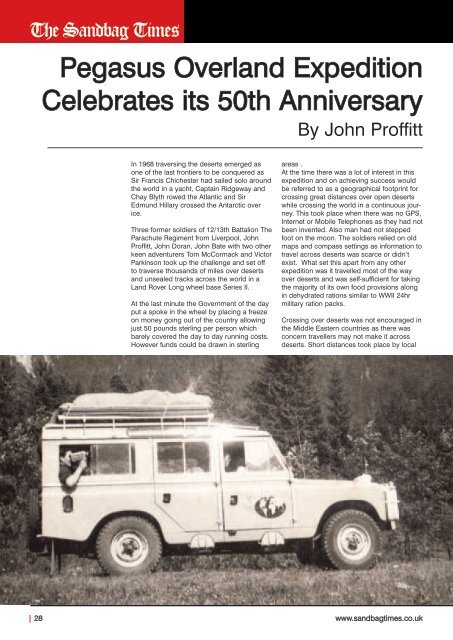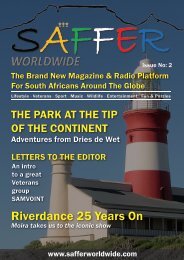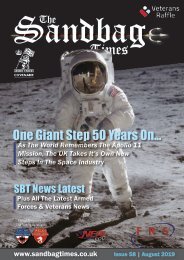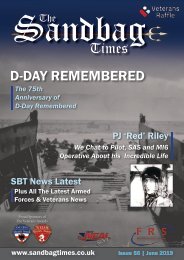The Sandbag Times Issue No: 49
The Veterans Magazine
The Veterans Magazine
You also want an ePaper? Increase the reach of your titles
YUMPU automatically turns print PDFs into web optimized ePapers that Google loves.
Pegasus Overland Expedition<br />
Celebrates its 50th Anniversary<br />
By John Proffitt<br />
In 1968 traversing the deserts emerged as<br />
one of the last frontiers to be conquered as<br />
Sir Francis Chichester had sailed solo around<br />
the world in a yacht, Captain Ridgeway and<br />
Chay Blyth rowed the Atlantic and Sir<br />
Edmund Hillary crossed the Antarctic over<br />
ice.<br />
Three former soldiers of 12/13th Battalion <strong>The</strong><br />
Parachute Regiment from Liverpool, John<br />
Proffitt, John Doran, John Bate with two other<br />
keen adventurers Tom McCormack and Victor<br />
Parkinson took up the challenge and set off<br />
to traverse thousands of miles over deserts<br />
and unsealed tracks across the world in a<br />
Land Rover Long wheel base Series II.<br />
At the last minute the Government of the day<br />
put a spoke in the wheel by placing a freeze<br />
on money going out of the country allowing<br />
just 50 pounds sterling per person which<br />
barely covered the day to day running costs.<br />
However funds could be drawn in sterling<br />
areas .<br />
At the time there was a lot of interest in this<br />
expedition and on achieving success would<br />
be referred to as a geographical footprint for<br />
crossing great distances over open deserts<br />
while crossing the world in a continuous journey.<br />
This took place when there was no GPS,<br />
Internet or Mobile Telephones as they had not<br />
been invented. Also man had not stepped<br />
foot on the moon. <strong>The</strong> soldiers relied on old<br />
maps and compass settings as information to<br />
travel across deserts was scarce or didn’t<br />
exist. What set this apart from any other<br />
expedition was it travelled most of the way<br />
over deserts and was self-sufficient for taking<br />
the majority of its own food provisions along<br />
in dehydrated rations similar to WWII 24hr<br />
military ration packs.<br />
Crossing over deserts was not encouraged in<br />
the Middle Eastern countries as there was<br />
concern travellers may not make it across<br />
deserts. Short distances took place by local<br />
| 28<br />
www.sandbagtimes.co.uk


















